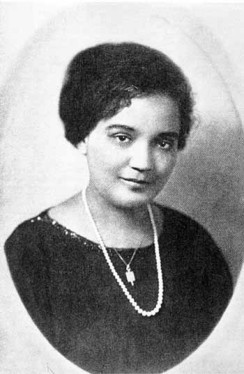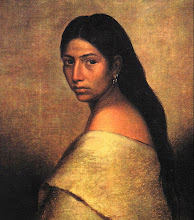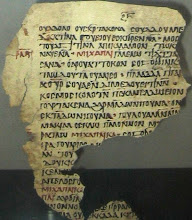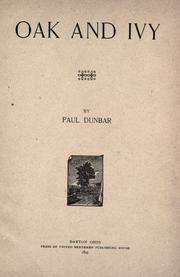
Born in Philadelphia, and educated at Cornell, the University of Pennsylvania, and the Collège de France, Jessie Fauset (1882-1961) has taught French at Dunbar High School in Washington and in New York City. She has written verse as well as the novels There is Confusion (1924), Plum Bun (1929), The Chinaberry Tree (1932), and Comedy, American Style (1933). The excerpt below is from the last-named novel.
[Color Struck]
Mrs. Olivia Blanchard Cary glanced out of the window of her pleasant residence in West Philadelphia and saw her daughter Teresa, her books under her arm, strolling down the street, with two other little girls similarly laden. One of her companions, a very fair blonde with dark blue eyes and gay gilt hair, Mrs. Cary identified immediately as Phebe Grant. She was not so sure of the identity of the third youngster. Closer inspection revealed to her, however, the dark brown, the piquant features, the sparkling black eyes and the abundant, silky and intensely curly locks of Marise Davies. Mrs. Cary frowned. "As often as I've told Teresa to keep away from that Davies child!" she murmured angrily to herself.
She met them at the front door. The countenances of the three children were in striking contrast. Teresa's wore a look of apprehension, Phebe's of bland indifference, Marise's of acute expectancy.
"Good-afternoon, Teresa," Olivia said. "Good-afternoon children. I’m afraid it's not best for Teresa to have so much company today.
She gets excited and worn out and it’s hard afterwards for her to settle down to her lessons. I don't mind if one of you stays. Phebe, suppose you come in and play with her a while, and Marise, you can come back another time.”
"Tomorrow? " asked Marise, whose black eyes had never left Olivia’s face.
"Well, hardly tomorrow,” the woman replied, flushing a little. She really disliked this child. "Horrid, little pushing thing,” she inwardly apostrophized. But aloud she continued. "Hardly tomorrow, but some other day very soon, I am sure. Come on in, Phebe.”
"No, thank you, Mrs. Cary,” the child answered, pushing back the thick gilt hair which framed her face. “I was with Marise first, so I'll go on with her. We were just going to ask you to let Teresa come along with us. My mother expects me to be at Marise’s if I’m not home.” She spoke simply, no trace of the avenging angel about her.
The two children, hand in hand, backed off the bottom step on which they had been precariously teetering. Marise, ignoring Olivia completely, waved a slender hand toward Teresa. “Come on over whenever you can. My mother doesn't mind."
From the pavement both looked back once, more to wave a careless farewell to their schoolmate. “G’bye, Treesa!”
“Treesa!” Olivia echoed angrily. “Why can't they pronounce your name right?" She glanced sharply at her daughter's tear-stained face. "What's the matter, Teresa?"
The little girl wiped away a tear with the back of her hand.
"Mamma, why, can’t play with Marise? She’s such fun.”
Her mother sighed. I have " she thought, "the stupidest children and husband too in the world. Why can’t they see this thing the way I want it?” Not unkindly she took out her handkerchief and wiped the child's eyes.
"Now, Teresa, it isn't worth while going all over this matter again. I don't mind your having Phebe here; in fact I rather like Phebe. But I don’t like to have colored people in the house if we can possibly avoid it.”
"But, Mamma, Phebe is colored too."
“I know she is but nobody would ever guess it.”
“They don’t have to guess it; she tells it; she stood right up in class and said so.”
“What nonsense!” Olivia countered angrily. “What occasion would a girl, looking like her, have to talk about color?”
“She didn't say it of her own accord, Mamma. The teacher was having a review lesson on races one day and she asked Phebe what race she belonged to and Phebe said: `I belong to the black or Negro race.’”
"What did the teacher say?"
She just giggled at first and then she said: `Well, Phebe, we all know that isn't true. Don't try to be funny. Now tell us what race you do belong to, dear!' And Phebe said it all over again. She said: ‘I belong to the black or Negro race.’”
Olivia gasped. "Silly little thing! The idea of a girl as white as she saying that! What happened then?"
The teacher had her stay after school and Phebe showed her the picture of her mother. She wears it in a locket around her throat all the time. And her mother is colored. Not black, you know, Mamma, but real, real brown. Almost as brown as Marise, you know. You should have seen how surprised Miss Packer was!"
In spite of herself the mother was interested. "What did she say then?"
"She looked awful queer and asked Phebe if she looked like like her father and Phebe said she looked exactly like him . . . and that he didn't live here and that he was married to someone else…
And then Miss Packer turned kind of red and never said another word. ... How can Phebe's father not be married to her mother, Mamma?"
"Oh, I don't know . . . probably they couldn't get along so they seperated. Married people often do that. They call it getting a divorce." Hurriedly she changed the subject: "Did the children act any different to Phebe after that?"
Teresa considered this a moment. "Well, you see, Mamma, the chiIdren don't act any special kind of way to Phebe anyway, because Phebe don't care anything about them. The only child Phebe likes a whole lot in school is Marise."
"I thought she liked you."
“O she does, but not the same way she likes Marise. Marise is so smart you know. She can think up all the most wonderful things. Why she changed her name herself. It used to be Maria. And she said that was all wrong. She said she didn't look like a Maria person and she didn't feel like a Maria person…. Isn't that funny, Mamma? And she can sing and play and dance. You never saw anyone dance like her. And she can think up such smart things to say. I don't see why you don't like her, Mamma."
"I don't dislike her," her mother retorted in exasperation. "You don't understand these things, yet, Teresa. But you will when you're older . . . and you'll be grateful to me. I just don't want you to have Marise and people like that around because I don't want you to grow up among folks who live the life that most colored people have to live ... narrow and stultified and stupid. Always pushed in the background . . . out of everything. Looked down upon and despised! ...
"Teresa, how many times must I tell you these things? You and your father and Christopher almost drive me crazy! You're so will-fully perverse about it all! Here we could all be as white as the whitest people in Philadelphia. When we moved in this neighborhood not a soul here but thought we were white! And your father is never happy unless he has some typical Negro hanging about. I believe he does it to tease me. And now here you are, all wrapped up in this Davies child!"
"But, Mamma, what difference does it make? And anyway, there's Oliver!"
There indeed was Oliver.
Olivia, with very little love for her husband, Dr. Cary, with no enthusiasm, as such, for the institution of matrimony and with absolutely no urge for the maternal life, had none the less gone cheerfully and willingly into both marriage and motherhood because she believed that through her children she might obtain her heart’s desire. She could, she was sure, imbue her offspring with precept and example to such an extent that it would never enter their minds to acknowledge the strain of black blood which in considerable dilution would flow through their veins.
She could be certain of their color. Her twin sister and brother, only two years older than her own children, had proven that. It was worth every one, she felt, of her labor pains not to hold in her arms little Teresa, her first-born, – but to gaze on that tiny, unremarkable face and note the white skin, the thick, "good" dark hair which covered the frail skull; to note that the tell-tale half-moons of which she had so often read were conspicuously absent. It seemed to her that the tenuous bonds holding her ever so slightly to her group, and its station in America, were perceptibly weakened. Every time she appeared in public with the little girl she was presenting the incontestable proof of her white womanhood…
And when Christopher, the second child was born, she was not the least fraction worried over the closely curling tendency of his slightly reddish hair. She had known Jews with hair much kinkier. Time and care would attend to all that. And meanwhile his skin was actually fairer than that of his little sister, his features finer and better chiselled. He had, she felt, a look of "race," by which she meant of course the only race which God, or Nature, for hidden, inscrutable purposes, meant should rule.
But she had not reckoned with the children's father. Christopher had finally established in his the fact of his chaste wife’s frigidity. When he fully realized that her much-prized "aloofness," instead of being the insigne of a wealth of feeling, was merely the result of an absolute vacuum of passion, young as he was, he resolved not to kick against the pricks.
He had, he told himself, been sold, as many a man before him had; tricked as completely by his deliberate submission to ideals, entirely false to his nature and his desires, as a young girl might be by her first surrender to a passion which her heart tells her is natural, though her mind and breeding might warn her of its inexpediency. The first of that hardening process which was so to change him did have its inception during this period, but as he had some humor and a sense of justice beyond his years he refused to let the iron enter his soul.
Moreover, Olivia, though not a "comfortable" house-keeper, was a clean and considerate one. She really never interfered with his “papers”; she never, even from the beginning, troubled him with the delinquencies of the help. And in those days, and for some years to come, she never exceeded the budget which he allowed her. Also her obvious willingness, even eagerness, to have children pleased and touched him. In his total ignorance of the plans which nestled eternally in the back of her sleek, dark head, he reasoned that a woman so fond of children must by a very natural extension develop eventually a certain tenderness for their father. So he hoped for many things and forgave her much with a somewhat rueful and yet amused indulgence.
Until he found in her the unalterable determination to carry himself and his children definitely across the narrow border-line of race! This too he at first regarded with some indulgence, but her unimaginative persistence finally irritated him. He was too busy to undertake completely the education of the children – he was responsible for their maintenance. But he could let them see his manifest respect and liking for many men who had been his boyhood friends and who bore the badge of their mixed blood plainly upon them.
He told the children every story he knew about the heroes of the race. Olivia would have preferred them to be ignorant of their own remote connection with slavery. But he did strive to make them realize the contrast between their present status and that of their black forebears. He emphasized the racial progress, stressing the brief span of years in which it had been accomplished.
And the children, straightforward, serious little things without an ounce of perversity in their make-up, were entranced, thrilled. Perhaps because they never met with any open expression of prejudice they seemed to find their greatest interest and amusement among the children of their father's friends who most definitely showed color. For a brief while Christopher's hero was Crispus Attucks; Teresa's brave Sojourner Truth. But later, through lack of nourishment, their interest in this phase of history died.
........................................
When the children were four and a half, and six, respectively, Olivia found she was going to have another baby. She was really very happy about it with a naïvete and a frankness which, Dr. Cary, as before, found inexpressibly moving and charming. Within herself she was making plans. This child should be her very own. She would make her husband believe that she needed a change, she would take the child away and live with him apart for two, three, perhaps five years. In appearance, in rearing, in beliefs he should be completely, unrelievedly a member of the dominant race. She was a much wiser woman than she had been six years ago. The prospect made her gay and charming, almost girlish; far younger too than her twenty-eight years, younger indeed it seemed to her husband than she had ever been in those remote, so precious years of training.
"This one will be a boy," she told big Christopher gaily. “He’ll be the handsomest and most attractive of us all. And I'll name him after myself. An Oliver for your Christopher."
Her prophecy was, except in one respect, absolutely true. She had boasted of the ease with which her children had entered the world. But this one she was confident would outstrip them all.
"I'm sure I'll be up very soon, Chris," she told her husband. She adopted one of her rare moods of coquetry. "And when I do get up, you ought to reward a dutiful wife. How would you like to send her and your baby son on a little trip to England?" Her eyes were bright with secrecy. He would, he assured her, do anything, give her anything she wanted within his range.
But the unforseen happened. The baby arrived in due course. "Hale and hearty," said his beaming father. There never was a baby haler and heartier. But Olivia did not fare so well. She had one sinking spell after another. For the first time she was unable to nurse her child. She was to meet with no excitement or shock and as the baby was going very well it was best for her not to be concerned with him for a while. She was to concentrate on recovering her strength. So that it was a full month before the baby was set before her, crowing and laughing and persistently and futilely striking his Iittle hands together.
Olivia sat up, arms outstretched to receive him. Her baby! Her eyes stretched wide to behold every fraction of his tiny person. But the expectant smile faded as completely as though an unseen hand had wiped it off. She turned to her husband sharply:
“That's not my baby!"
But it was her baby. It was a boy, handsomer and more attractive than the other children. He was named Oliver... They had been calling him that for a month, her delighted children assured her… his hair was black and soft and curly... and he had the exact bronze gold complexion of Lee Blanchard!
She had reckoned without her own father!
..........................................
For the first time since she had known the futile anger of her early childhood she slipped into a black, though silent, rage. Her early anger had been directed against her father. This later ebullition included both her husband and her helpless little boy. She had no special beliefs about prenatal influences but she did observe to herself in the dark and tortuous recesses of her mind that if big Christopher had not been so decidedly a Negrophile, the appearance of their child would have been otherwise.
The little fellow was of a remarkable beauty. Through one pretext and another Olivia contrived not to be seen on the street with him. But the two older children and his father would proudly conduct him anywhere. And wherever he went he attracted attention… infinitely more so than his brother and sister had ever earned. Added to this was an undeniable charm of manner and of mind. He possessed not only a winning smile and a genuine sweetness of attitude and conduct but he was unquestionably of remarkable mental endowment... If he had possessed an ounce of self-confidence, or even of the ordinary childish conceit which so often marks the "bright boy," he might easily have become unbearable. But even from babyhood little Oliver sensed in himself one lack which early automatically destroyed any root of undue self-esteem. He knew he did not have his mother's love…. Worse than that through some strange childish, unfailing perception he was sure of her active but hidden dislike for him.
When he was home Olivia fed him with the same food, watched over and satisfied his physical welfare as completely and meticulously as she watched over that of the other members of her household. But she never sought his company, she never took him riding or walking as she did the others, never bestowed on him more than the perfunctory kiss of salutation… When people, struck with his appearance and healthy grace, praised him before his face as so often they did, he would turn sometimes toward her thinking dimly that now she must be proud of this fine little boy who was her son. But he never surprised on her countenance a single flash of delight or pride or love.
It saddened his childish days... As soon as he became old enough to be from under her surveillance Olivia saw to it that he spent most of his time with her own mother in Boston or with her husband's mother in South Philadelphia. In both of these homes he met with the intense affection and generous esteem which his finely keyed little nature so craved. Gradually he became able to adjust himself to the inexplicable phenomenon of a mother who not only did not love with especial signal fondness, but who did not love at all, her youngest son. By sheer strength of will he forced himself to steel his brave and loyal heart against this defection and to crush down his pain. His father had some sense of what was happening and in his heart he bore his wife a deep and unyielding dislike.








.jpg)











7 comments:
obat aborsi http://www.apotekfarmasi.com
alat bantu sex http://www.tokovirgin.com/
Main game yuk? dan di permainan game ini banyak
memberikan promo dan bonus menarik
untuk info lebih lanjut :
-LIVE CHAT : www,mgmdomino,net
-PIN BBM : D88FDB2E
-WHATSAPP +85577597038
KEPUASAN ANDA ADALAH KEBANGGAAN KAMI..!!!
MGMPOPKER88
DOMINO Q
Poker Online
DOMINO Qiu Qiu
Capsa Susun
Agen Domino Online
Agen Poker Online
Agen Poker 88
http://vibesofhumanity.blogspot.com/2011/06/excerpt-from-from-superman-to-man-by-ja.html
join my web.. poker88
hi yuk bergabung bersama kami.... iramapoker
Post a Comment